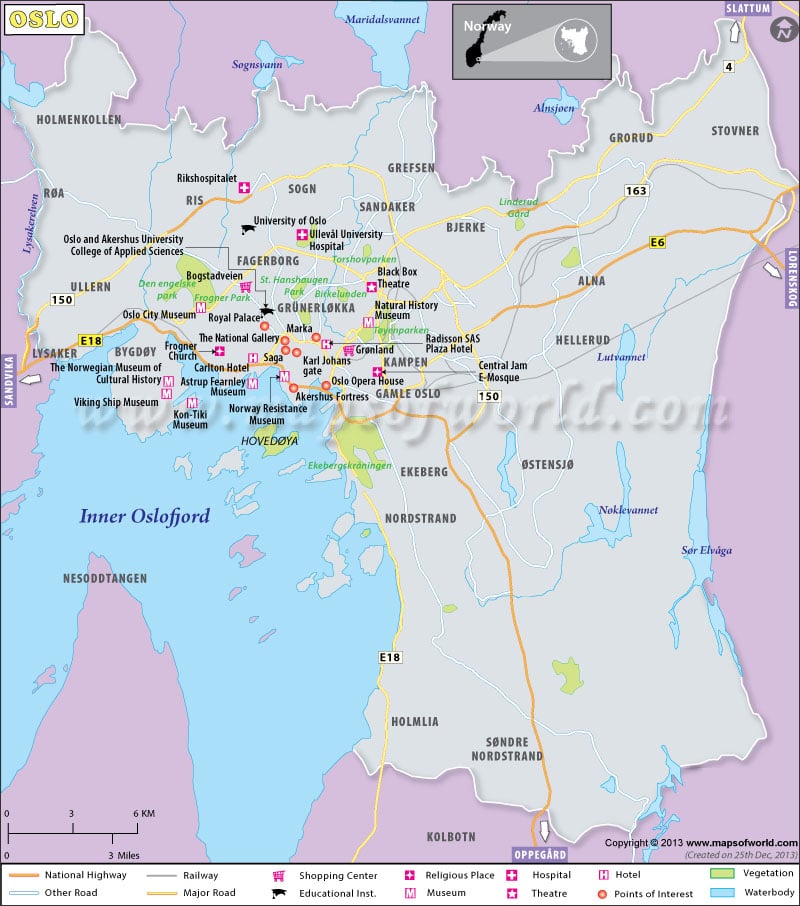Facts About Oslo City |
| Country | Norway |
| Latitude and Longitude | 59.9500 N, 10.7500 E |
| Population of Oslo | 1.1 million estimates 2022 |
| Area | 454.03 sq. km. |
| Languages of Oslo | Norwegian, English |
| Time Zone | CET (UTC +1) |
| Area Code | +47 (Norway) +2 (Oslo) |
| Airports Oslo | Gardermoen Airport, Rugge Airport, Torp Airport |
| Ethnicity | Norwegian |
| Points of Interest | Froguer Park, Viking Ship Museum, Akershus Fortress, Fram Museum, Norwegian Museum of Cultural History, Vigeland Museum, Oslo Opera House, Kon-Tiki Museum, Royal Palace Oslo, Nobel Peace Center, Oslofjord |
| Demonyn | Oslovian, Oslofolk |
About City
Oslo is Norway’s capital and most populous city. It has a population of over 1 million and is the fastest-growing city in the country, being the main business, cultural, and education center. Out of the city’s over 400 sq. km. area, half of it is covered with parks and forests, making it a green city.
Geography
Oslo is located at the northern end of the Oslofjord with 40 islands surrounding the city limits. All its other directions are covered with hills and mountains, with several lakes and rivers found throughout the city.
How to Reach
Airports – the main international airport that serves Oslo is Oslo Airport Gardermoen, located 45 km from the city center, with over 100 international and domestic destinations. Two secondary airports are found within the city limits, which are the Rygge Airport and Torp Airport, with the latter located 110 km away.
- Train – Oslo has a comprehensive railway network that makes public transportation easy and accessible. The central hub is the Oslo Central Station with services to all the major cities in Southern Norway, including trips to Sweden’s Stockholm and Gothenburg.
- Bus – there are 32 city lines that bring passengers to and from the neighboring regions.
- Taxi – several taxi companies are available in the city with sightseeing taxi guides for personal services.
- Ferry – this is the main mode of transportation for going to and from the city islands, as well as a cruise ferry that serves daily trips to Copenhagen and Frederikshavn in Denmark, and Kiel in Germany.
When to Visit
The best time to visit Oslo is from March to August during the spring and summer seasons. Temperatures rise during these times and accommodation is surprisingly affordable. Along with Stockholm, Oslo experiences almost 24-hour daylights in June or July – perfect for summer visits to the city’s top attractions and events. Visitors who wish to travel from September to February should expect colder temperatures, winter festivals, and events, and the city’s almost 24 hours of total darkness in the winter.
Culture (fairs and festivals) and Traditions
Summer in Oslo is a great time for plenty of music festivals, feasts, and celebrations, while the winter season offers its round of winter sports events and holiday festivals. Among the most popular festivals and events in Oslo are:
- Oya Festival – an international music festival held annually in August, world-famous pop acts and up-and-coming artists gather to provide 4 days of music and entertainment. An open-air festival, it is visited by over 60,000 spectators each year.
- St. Hallvard’s Feast Day – a celebration of the city’s patron saint, St. Hallvard, it is a quiet event highlighted by a religious mass every 15th of May, which is St. Hallvard’s death anniversary. Concerts, ceremonies, and religious services are part of this yearly celebration.
- Oslo Marathon – one of the biggest sporting events in the country, the Oslo Marathon is participated by over 10,000 runners and watched by over 100,000 spectators a year.
Nobel Peace Prize Award Ceremony and Concert – held every year on December 10, the Nobel Peace Prize is the most prestigious prize in the world, with its ceremony and concert attended by world-renowned personalities. The concert is attended by over 7,000 people and broadcast to over 100 countries in the world.
Points of Interest
There are plenty of things to do and see in Oslo – ranging from natural wonders to shopping centers, museums, and castles. Here are Oslo’s top places to visit:
-
The Vigelandsparken Sculpture Park
With over 200 sculptures created by Norwegian sculptor Gustav Vigeland, this 80-acre park is visited by over 1 million people every year. Open round the clock, the park features Vigeland’s thought-provoking and incredible art pieces that are out of this world.
-
The TusenFryd Amusement Park
Norway’s largest amusement park, families from around the country and even the world visit this park’s over 30 attractions of rides, games, shops, and places to eat.
-
The Norwegian National Opera and Ballet
Located at the Oslo Opera House, the institution is Norway’s largest and the first ever opera house to let its visitors walk on its roof.
-
The Akershus Fortress
Located in the city center near the Oslofjord, the Fortress is the best way to learn and discover the city’s history.
Accommodation
There are over 50 hotels in Oslo, with one for every price category. There is a large number of luxury hotels, as well as youth and family hostels, campsites for backpackers, guest houses for those who want more intimate accommodation, as well as private houses for rent.

